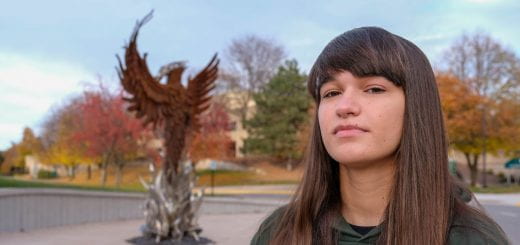Social Justice Issues in Slovakia
Sometimes seen as castoffs from Slovakian society, the Roma people often struggle with getting the basics necessities of life—medical care, hygienic care, education, culure.
A UW-Green Bay study abroad course called “Social Justice Issues in Slovakia” looks to curb the inequities bestowed upon the Roma living in the eastern European country.
“Even though they’re guaranteed by the Slovak government to get health care and education… most have a very difficult time cashing in on that promise,” said UW-Green Bay Prof. Angela Bauer-Dantoin, who with Prof. Sarah Meredith led seven students and a handful of community members on the journey.
For the last three years, UW-Green Bay students and faculty have gone on humanitarian missions to bring information to the Roma—often times inappropriately referred to as gypsies—about a variety of health care topics, and to engage in art and music activities with Roma children. Community drives have produced boxes full of donated medicines, hygienic products, toothbrushes, art supplies and musical instruments.
Students are able to teach the Roma CPR, the Heimlich maneuver, basic first aid and more. They made music together, traded dance moves and literally painted the towns as the group helped create outdoor murals on walls in four Roma settlements near the city of Poprad.
For sophomore biology major Samuel Matthews, the course did more than just bolster his résumé and earn him credits.
“It changed me as a person. It really opened my eyes to what’s out there and it was just awesome,” he said.
VIDEO TRANSCRIPT
Social Justice Issues in Slovakia
A University of Wisconsin-Green Bay Service Learning Travel CourseProf. Angela Bauer-Dantoin
Human Biology
For the third year in a row we’ll be leading a travel course called “Social Justice Issues in Slovakia.” We’re going into Slovakia and conducting some service-learning projects in the Roma settlements, the gypsy settlements in Slovakia. And we’re doing a number of things. We’re running some health and hygiene clinics and also some music and art camps for the children.In Slovakia, they’re (the Roma) a population within Slovakia that lives sort of within the fringes of society. They’re disadvantaged in pretty much in every area of life. Even though they’re guaranteed by the Slovak government to get health care and education and so fourth, most have a very difficult time cashing in on that promise. So as a result, many aren’t getting the health care that they need and the education and so fourth.
So what we’re doing with our service learning project is going in and leading clinics to teach them about basic health and hygiene issues, proper dental care and so fourth, to hopefully alleviate and educate on this issue.
Samuel Matthews
Sophomore, Human Biology Major
We created a slide show with first aid treatment, varying from animal wounds and bites, to burns, to wound care, first aid treatment, hygiene, basic hygiene, CPR, choking, Heimlich maneuvers, things for mothers to use with their children, things for fathers to use with their children; mainly family care just to make sure that everybody’s OK until someone can get there to take care of themThis history there is that they’re kind of a culture that’s been discriminated against so that they’ve been kind of excluded from normal society. That’s caused them to have a little poorer image of themselves, and also, they’re kind of secluded so they don’t get the proper healthcare they need.
It is getting better, but it’s progressive. I think what we did there was give a little more visibility to the Slovak people also, and the government, showing them that ‘hey, these people are humans and we’re here to help.’
Jessice Pudelko
Sophomore, Human Biology Major
It appeared as though when we were doing our presentations and talking with them and showing them proper ways to give proper care, that they were thoroughly interested and had a desire to learn.Prof. Angela Bauer-Dantoin
Travel courses, I think, can be one of the most transformative experiences for students. I think it’s an incredible time for personal growth with our students. I would say all of them report having come home from these travel courses as being a different person with a very different perspective on the world.Samuel Matthews
For me, the travel course not only just opened my eyes, but it’s also an upper level human bio course, so it also helped with my resume, my transcript for future medical school. It changed me as a person. It really opened my eyes to what’s out there and it was just awesome.
http://www.uwgb.edu/international/
Making the trip to Slovakia were:
UW-Green Bay students
Amanda Atwood
Staci Goldsmith
Tiffany Hill-Morois
Samuel Matthews
Brooke Miller
Sarah Penke
Jessica Pudelko
Community members:
Katina Daanen-Vainisi
Lindsey Gardner
Collette LaRue
Linda Olson
Anita Zipperer
Trip Leaders
Prof. Angela Bauer-Dantoin
Prof. Sarah Meredith






